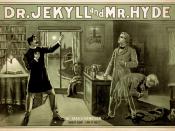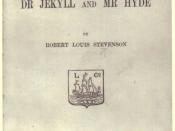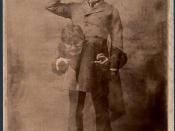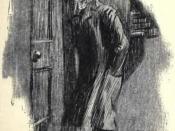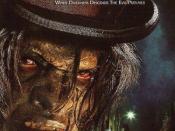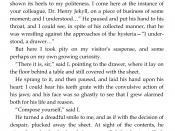Who Is Mr. Hyde? Often in life we ponder the existence of another self. We ask, can one person really have two distinct personalities? If so, is there a point when these personalities can be so different that they can physically become two people? We know that it can happen mentally but not physically, except for The Strange Case of Dr. Jekyll and Mr. Hyde. In this novel I deem that Dr. Jekyll is suffering from a severe mood disorder, quite feasibly dissociative identity disorder. A mood disorder is a "psychological disorder characterized by emotional extremes"ÃÂ (Meyers 545). Dissociative identity disorder occurs when someone is "said to have two or more distinct identities that alternatively control the person's behavior"ÃÂ (Meyers 551). I see these manifestations in the character of Dr. Jekyll.
First off, when a person is suffering from a mood disorder, quite they have negative thoughts, which result in negative moods and actions (Meyers 550).
This is represented in Dr. Jekyll and Mr. Hyde because Dr. Jekyll had such negative thoughts. Though the author never directly relates these negative thoughts he implies them in Dr. Jekyll's confession "Hence it came about that I concealed my pleasures"æI regarded and hid them with an almost morbid sense of shame"à(Stevenson 78). He was afraid to show these feelings, he needed to find an outlet to release his bad traits in a way that he could not be blamed for them. This led to his negative action of creating a potion to transform him into someone who looked completely different from him, this person became Mr. Hyde,. Jekyll may not have completely realized that this was a negative action until after Mr. Hyde became a murderer. After all, "Hyde is too forceful a character, too complex to be imprisoned inside a crude case of split personalities"à(Charyn 105). This could mean that the mood disorder Dr. Jekyll was suffering from, dissociative disorder, was too overpowering that he needed to disguise it from himself, as well as from others. That is the reason that he was so intent on finding the formula with which he could create Mr. Hyde.
A person that can be prim and proper one moment and loud the next may have the mood disorder called dissociative disorder. "There are cases in which the person reportedly became dissociated into a "good"ÃÂ and "bad"ÃÂ or aggressive personality"ÃÂ (Meyer 554). This is obviously characterized in Dr. Jekyll, the "good"ÃÂ personality of a man, and Mr. Hyde, the "bad"ÃÂ personality of the same man. In some cases of dissociative disorder, one personality may not agree with what the other is doing but is incapable of stopping it (Meyer 554). For example after Mr. Hyde murdered Sir Danvers Carew, Dr. Jekyll realized that he no longer wanted the personality of Hyde to come out, but was unable to stop him from appearing on his own (Stevenson 96). The more Jekyll let Hyde appear the more Hyde's personality developed. He was able to use his newfound maturity to become the dominant personality and show up whenever he wanted.
Dr. Jekyll had a breakthrough when he was able to identify that he had two diverse personalities. Once he made this initial discovery, he set out to find a way to disassociate one personality from the other. He was able to derive a potion that left his "good"ÃÂ personality in the bodily stature of Jekyll, and transformed his "bad"ÃÂ personality into a man of small build who seemed younger than Jekyll himself, and named this personality Mr. Hyde. Mr. Hyde "gave an impression of deformity"ÃÂ to everyone he came into contact with, though no one could explain it. It could be that people could sense and feel his evilness (Stevenson 18). Mr. Hyde may have appeared younger than Dr. Jekyll because the "bad"ÃÂ personality of the man was being unleashed for the first time since Dr. Jekyll's youth; therefore it was not as fully developed as the "good"ÃÂ personality. This helps to explain his dissociative disorder, and how his two personalities were able to be in the form of two different people.
Later, in a letter to Mr. Utterson, Jekyll's trusted friend and lawyer, we find out that before the deaths of the two men; Jekyll was no longer in control of Hyde. This means that Jekyll had lost control of the "bad"ÃÂ side of his personality. He grew very anxious, because he knew that to let Hyde have control could not only be detrimental to Dr. Jekyll himself but could harm society as well. Moreover, he realized that he liked his original "good"ÃÂ personality, he had an honorable reputation, and wished that things could go back to how they had been before the appearance of Mr. Hyde. It could also be that Jekyll became too addicted to the drug that had created Hyde. In turn, he was unable to stop taking the drug until Hyde became out of control. He was gaining more and more knowledge and his personality was developing even more. Hyde, being part of Jekyll, and therefore, just as smart, was able to figure out how to be the distinctive character.
It was soon too late for Jekyll to hide Mr. Hyde, and in turn Dr. Jekyll was suffering intolerable pain because he felt out of control, and could no longer keep his "bad"ÃÂ personality in. After Dr. Jekyll had created Mr. Hyde, he was always the dominant personality, until Mr. Hyde gained power over the body. This in turn could have been why Mr. Hyde started appearing more and more often, and why Jekyll's friends saw less and less of him. Dr. Jekyll knew the damage his reputation would obtain if anyone found out that he was Mr. Hyde. This, along with Jekyll's possible drug addiction, is what led Dr. Jekyll to the murder/suicide of himself. It was the body of Mr. Hyde that was found dead, but it was the personality of Dr. Jekyll that had killed Mr. Hyde, in killing Mr. Hyde, Dr. Jekyll inadvertently was forced to commit suicide. The man "died thinking like Jekyll and looking like Hyde, the secret sin which he hoped to conceal stamped incredibly on his face"ÃÂ (King 13). If two personalities share a soul, the death of one causes the death of the other.
Dr. Jekyll, before Mr. Hyde was given his own body, probably had Mr. Hyde's personality floating around inside his body, looking for a way out. This leads to the conclusion that Dr. Jekyll had both a "good"ÃÂ and a "bad"ÃÂ personality, which could quite possibly be diagnosed as a mood disorder, specifically dissociative disorder. Dr. Jekyll was unable to keep his "bad"ÃÂ personality in, but he only wanted people to see his "good"ÃÂ personality, so he had to make an alternate body for his "bad"ÃÂ personality to harbor in; this body became known to many as Mr. Hyde.
Works Cited Charyn, Jerome. Afterword. In The Strange Case of Dr. Jekyll and Mr. Hyde. By Robert Louis Stevenson. New York. Bantam, 1981. 105-114.
King, Stephen. Danse Macabre. 1981. New York: Berkley, 1982.
Myers, David G. Psychology. Sixth Edition. New York: Worth Publishers, 2001.
Stevenson, Robert Louis. The Strange Case of Dr. Jekyll and Mr. Hyde. 1886. New York: Bantam, 1981.
